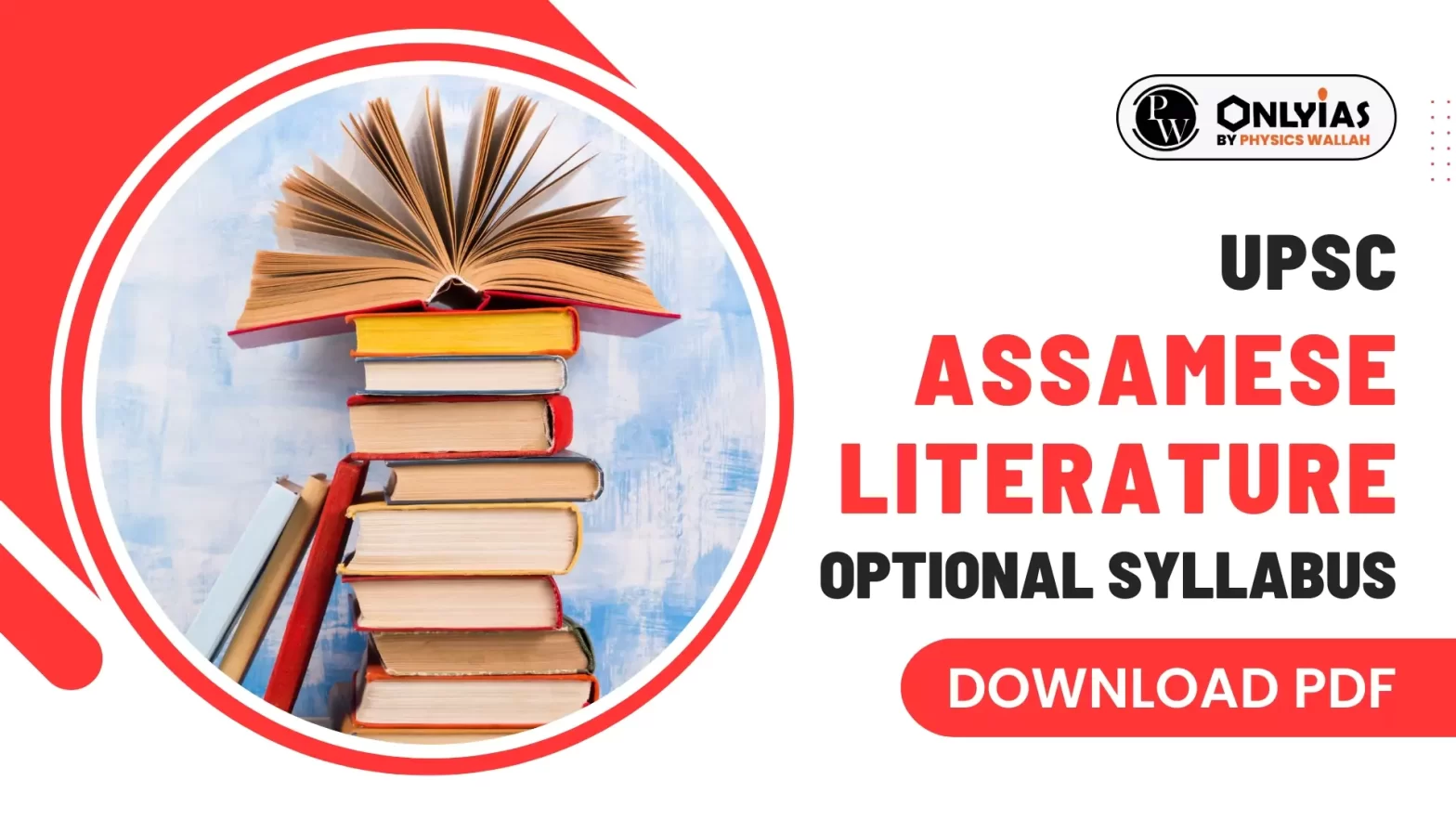Prepare for the UPSC Assamese Literature Optional exam including syllabus, paper pattern, recommended books, previous year question papers, expert preparation tips.

UPSC Assamese literature Optional is listed as one of the subjects in the UPSC mains exam, categorized under “Literature of any one of the following languages.” Among the 23 language subjects mentioned by UPSC, Assamese literature is included. In this article, we will try to explore every possible dimension of Assamese literature which will help candidates to score high marks in this subject.
The UPSC Assamese Literature Optional Subject offers candidates an opportunity to find out the literary tradition and development of Assamese literature. It covers a range of topics from medieval to modern Assamese literature. It offers candidates to go through the works of prominent literary figures and analyze the cultural and historical contexts that have shaped Assamese literature over the centuries.
Like all other optional subjects of UPSC optional subject list, the subject is made up of two papers, Paper 1 and Paper 2, each paper carrying 250 marks. Each paper is divided into two sections. Each paper has a total of eight questions, divided equally into four questions. A candidate has to attempt any five questions. Question 1 and Question 5 are compulsory. Out of the remaining six, any three have to be attempted, with at least one from each section. Answers must be written in Assamese language only.
| UPSC Assamese Literature Optional Exam Pattern | |
| Particular | Details |
| Total Papers | Two, Paper I and Paper II |
| Total Marks | 500 (250 Each) |
| Time allowed | 3 Hours for each paper |
| Sections | Section A and Section B |
| Questions | Total 8 questions with subparts |
| Compulsory Question | Question No. 1 and 5 |
| Marks Distribution | 10, 15, and 20 marker questions |
The UPSC Assamese Literature syllabus includes a comprehensive coverage into the Assamese Language and literary heritage of Assam. It covers the language’s development, from its origin to modern grammar and dialects. Candidates will also find literary criticism and historical periods, with a focus on the Vaisnavite era, folk influences, and the post-colonial landscape. Syllabus of Assamese Literature is divided into two segments i.e Paper 1 and Paper 2.
The UPSC Assamese Syllabus Paper 1 is divided into two sections: Section A focuses on Language, and Section B covers Literary Criticism and Literary History. Below is the detailed syllabus of UPSC Assamese Syllabus Paper 1.
| Section A | |
| 1. Language |
|
| Section B | |
| 2. Literary Criticism and Literary History |
|
UPSC Assamese Literature Optional Syllabus Paper II focuses on the candidates’ critical reading skills. This paper will require first-hand reading of the texts prescribed and will be designed to test the candidate’s critical ability. The UPSC Assamese Optional Paper 2 syllabus includes topics such as Ramayana (only Ayodhya Kanda), Parijat-Harana, Rasakrida by Sankaradeva, Bargeet, Rajasuya, Mor Jeevan Sonwaran, Gaonburha, and more. Find the detailed syllabus below.
| Section A |
|
|
|
|
|
|
|
| Section B |
|
|
|
|
|
|
|
|
|
|
It is advisable for candidates to choose books wisely from a wide range of options to score good marks in UPSC Assamese literature optional exam in IAS exam. The right books will help them cover all the topics easily and gain a better and more in-depth understanding of the exam sections. To ensure the best preparation, candidates can refer to the Assamese literature books and other subject-specific books mentioned below to excel in the exam.
| Booklist for Paper I | Book list for Paper II |
|
|
To gain command and to score high marks in Assamese Optional Subject it becomes very important to analyse the patterns and topics which have been asked in the last few years for this Previous Year Question Papers plays a crucial role. Previous year question papers.
Previous Year Question Papers of Assamese Literature can help candidates to get used to the question styles, weightage of topics, time management for the actual exam. List of Assamese Previous Year Question Papers are as follows.
| Year | Download Link |
| 2022 | UPSC Assamese Optional Paper 1 |
| 2020 | UPSC Assamese Optional Paper 1 |
| 2019 | UPSC Assamese Optional Paper 1 |
| 2018 | UPSC Optional Paper 1 |
Advantages and Disadvantages of UPSC Assamese Literature Optional
UPSC Optional subjects are numerous and each subject has its own domain and that is why each subject has its own advantages and disadvantages depending on the interest and background of candidates. Still we try to find out some advantages and disadvantages of Assamese Optional subjects.
| Advantages | Disadvantages |
|
|
Getting a good score in the UPSC exam for Assamese literature needs careful planning and doing things step by step. It’s important to get help from different places to do well in the exam. If you’re getting ready for the Assamese literature part of the exam, you can do better by following these steps:
Answer Sheets of the toppers who have given mock tests for Assamese Literature Optional can help candidates to get familiar with the writing style and flow of the answer which UPSC demands and can excel in this exam. The topper marksheet can be easily available to various blogs and telegram groups from where candidates can avoid them and analyse it.
Preparing for any optional subject is not enough without planning. If candidates are willing to choose Assamese Literature as their optional subject then they need to have a plan for both General Studies and Assamese Literature separately. This is because for literature candidates need to practice writing in the language script. Also candidates can look at previous successful candidates’ notes and watch their strategy videos to make their own plan for handling the challenges.
| Must Read | |
| NCERT Notes For UPSC | UPSC Daily Current Affairs |
| UPSC Blogs | UPSC Daily Editorials |
| Daily Current Affairs Quiz | Daily Main Answer Writing |
| UPSC Mains Previous Year Papers | UPSC Test Series 2024 |
Assamese can be a good optional subject for the UPSC exam for candidates who have a strong command of the language or have studied it extensively. It offers an opportunity to showcase their knowledge and expertise in Assamese literature and language.
The UPSC essay paper needs to be written in either English or any of the scheduled languages mentioned in the Eighth Schedule of the Constitution of India. Assamese is one of the scheduled languages, so it is allowed for the essay paper.
No, Assamese Paper 1 and Assamese Compulsory Papers are not the same in the UPSC exam. Assamese Paper 1 typically refers to the optional subject paper where candidates can choose Assamese literature as their optional subject. On the other hand, Assamese Compulsory Papers usually refer to the language papers that are compulsory for all candidates, which include the Assamese language paper along with papers for English and other Indian languages.
It depends, Candidates with non assamese background can find it very challenging to opt this subject.
It's advisable to choose a literature optional subject for UPSC if you've extensively studied it during your college years. This is because the preparation involves reading a significant amount of material. Additionally, finding coaching resources for these optional subjects might be limited, so prior familiarity with the subject can be beneficial.
<div class="new-fform">
</div>
